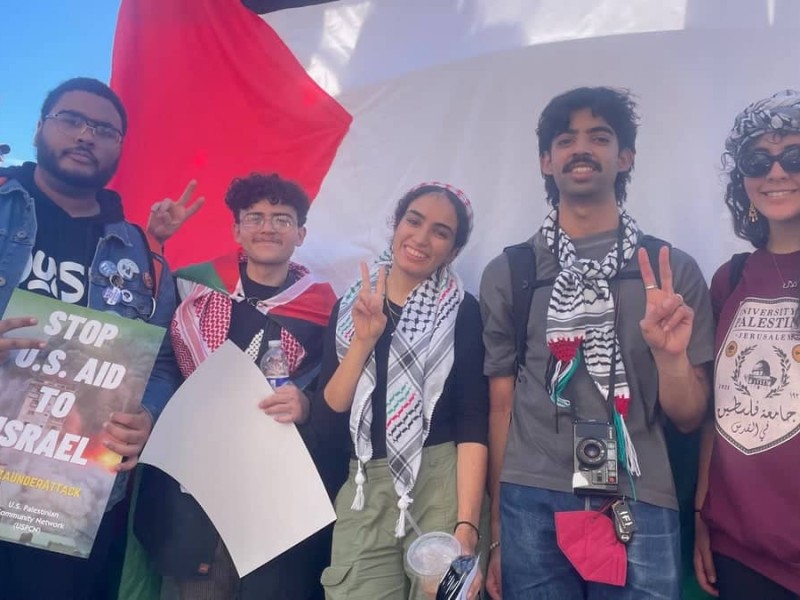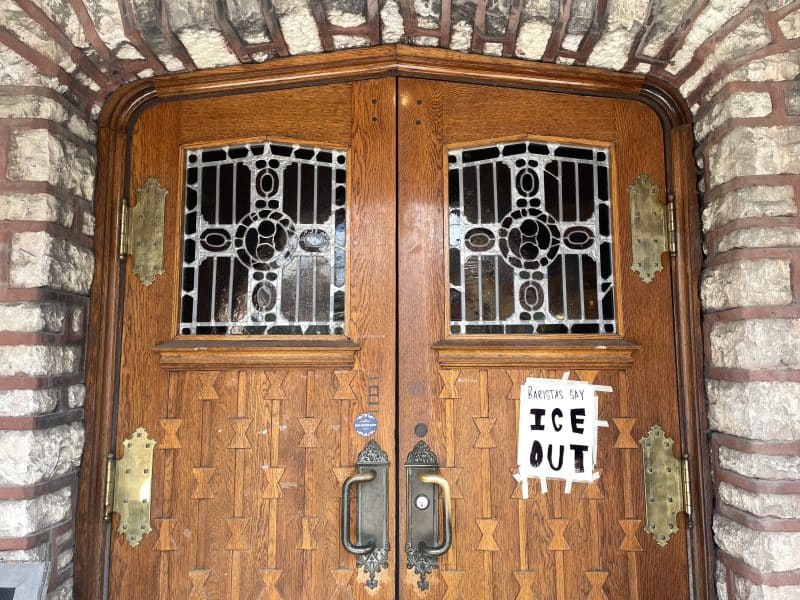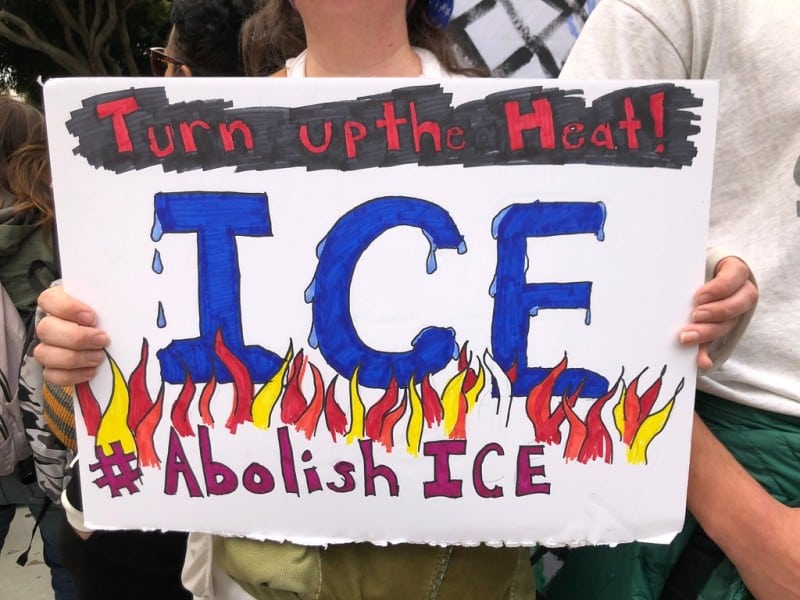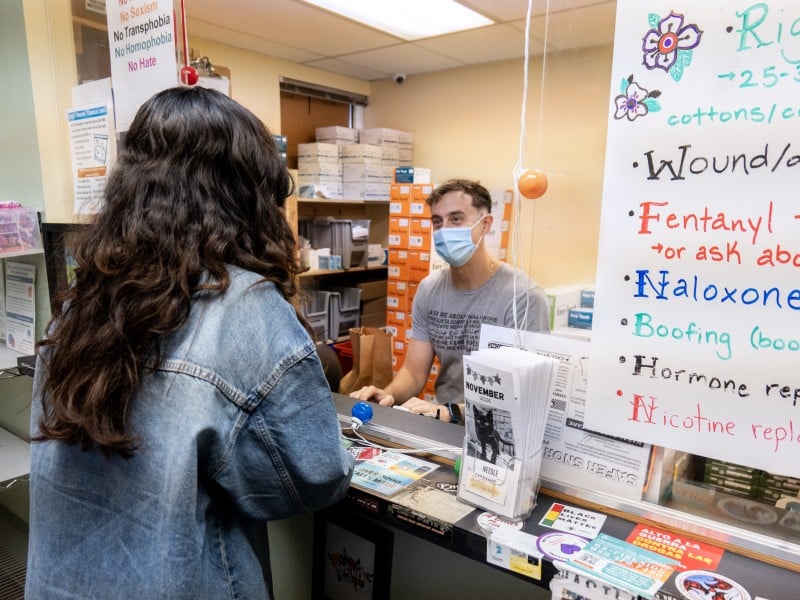Newly born Palestinian Liberation Movement finds light in the dark
The Columbus-based group – an offshoot of the social justice organization JUST – has staged protests and created monuments designed to call attention to the horrors unfolding in Gaza.

Hani Ali said the impact of forced displacement can linger for generations.
In a recent interview, the Ohio State graduate recalled how his ancestors living in the Palestinian city of Jaffa came under Israeli occupation during the 1948 Arab-Israeli war. In the weeks and months that followed, many Palestinians had their properties confiscated by the newly formed Israeli state, and those who didn’t flee were forcibly evicted from their homes in a mass displacement that became known as the Nakba, which is Arabic for “catastrophe.” (Roughly 15 percent of all Palestinian refugees can trace their origins to Jaffa.)
“And when the Nakba happened, we became known … as ‘The People of 48.’ And, technically, we have refugee status in Palestine. So, when this occupation ends, I should be able to go back and get citizenship,” Ali said in a series of late November interviews with five members of the Palestinian Liberation Movement – a newly formed outcrop of the Columbus-based social justice organization JUST (Justice, Unity and Social Transformation). “I’ve lived in many different places, and I’ve never truly been able to live around my people, in my homeland. There’s this feeling that if this [displacement] never happened, my whole life could have been different. I could have been living in Palestine, growing up with Palestinian kids, playing soccer in the streets. My entire being is different because of what happened. And this sense of belongingness, this sense of home, has always been this missing piece that I’ve had inside of me.”
Ali said these feelings have intensified during the ongoing siege of Gaza, launched by Israel in response to the deadly Hamas terror attack of Oct. 7, during which Israel’s relentless bombing campaign has created death on a horrific scale. A recent New York Times report described the civilian casualty rate in Gaza as on par with some of the worst conflicts of the 21st century, with estimates placing the number killed in excess of 14,000 – more than half of whom are women and children. “It’s beyond anything that I’ve seen in my career,” Marc Garlasco, a military adviser for the Dutch organization PAX and a former senior intelligence analyst at the Pentagon, told the Times. To find a historical comparison for so many large bombs being dropped in such a small area, Garlasco said, we may “have to go back to Vietnam, or the Second World War.”
The stories and images emerging from Gaza have helped to fuel a growing, global “free Palestine” movement, with marchers taking to the streets by the hundreds of thousands in cities stretching from New York to London. In Columbus, protesters have filled the streets outside of the Ohio Statehouse and taken over City Council meetings, while the Students for Justice in Palestine (SJP) at Ohio State marched through Wexner Center for the Arts to protest the cancellation of a planned panel discussion featuring Palestinian artist Jumana Manna. The group later released a statement urging support for Manna’s exhibit, which remains on display at the Wex.
The tensions brought about by the conflict, currently on a temporary pause in order to facilitate the exchange of hostages, have fueled sharp rises in antisemitism and Islamophobia throughout the United States – with increasingly tragic results. On Saturday, three college students of Palestinian descent were injured in a shooting in Burlington, Vermont. The suspect, a 48-year-old man who police said opened fire on the three “without speaking,” was arrested on Sunday. And in Columbus, a public safety notice was issued to students and faculty at Ohio State following an early November incident in which two Jewish students were approached off-campus by a pair of men who yelled slurs and assaulted them. One of the students was treated for their injuries at the Wexner Medical Center and released.
According to members of the PLM, the anti-Palestinian tensions on campus have been exacerbated by government officials and a media that frequently and falsely equate the free Palestine movement with being pro-Hamas, and by extension pro-terrorism, with the right-wing, Rupert Murdoch-owned New York Post publishing a column that explicitly described all pro-Palestine rallies as “anti-Israel, pro-Hamas, pro-terrorism and often antisemitic.”
“And that definitely trickles down to how [the Palestinian] community is viewed in Columbus, on campus and by the administration [at OSU],” Ali said.
“It’s easy for the media to portray things this way, because there’s already a bias against Arabs, against Palestinians, against Muslims,” said PLM member Yasmine Skalli.
It’s a bias that can reveal itself in seemingly subtle ways, such as a recent USA Today article about the hostage exchange in which Hamas is said to have taken “33 child hostages,” while the list of Palestinian prisoners taken by Israel is described as including “123 minors under the age of 18.”
“It’s clear what they’re doing and what the intent is, and it’s intentional in the way it dehumanizes Palestinians, and their supporters as well,” Skalli said.
Ohio State student and PLM member Dalal Shalash said this type of language has had a palpable impact on the atmosphere at OSU, which she said had grown noticeably uglier and more hostile in recent weeks. “There’s been an increase in Islamophobic tension on campus, an increase in anti-Palestinian animus on campus,” said Shalash, who received so many death threats to her student email in recent weeks that she started collecting them in a file on Google Drive. “Even my phone number has been doxxed, and I went through weeks where I couldn’t answer my phone, because the call would show up as a friend’s number, or my mom, but then it would be some man yelling at me in Hebrew.”
And yet, Shalash said she felt a deep conviction to push onward in organizing the free Palestine movement in Columbus, recalling how a colleague told her not to let mourning for the dead stop her from fighting like hell for the living. “And that resonated with me,” Shalash said. “There are videos of people in Gaza … and they’re not calling for people to mourn for them. They’re not calling for help. But they’re professing their faith in one another. I’m Palestinian, and when I hear something like that, it almost engrains in you as a Palestinian, as a Muslim, as an American – because we are funding this genocide – that you have to continue to act. And I think that’s what drives all of us.”
PLM-Just formed in mid-October, launching with the intent of “combatting the systemic oppression of Palestinians, with a primary mission to dismantle the Israeli occupation,” as the group wrote in its mission statement.
While Palestinian organizations such as SJP already existed on campus, Shalash and fellow member Abdul-Azeez Ahmad said it was important to create a space for the Palestinian community that existed outside of the university, particularly as Republican lawmakers advance legislation such as Senate Bill 83, which Shalash said could drastically diminish the voice given to students on campus related to issues of diversity. “It was incredibly important to have a space outside of the university for Palestinian organizing, and for the Palestinian community and its allies to really come together and showcase solidarity,” Shalash said.
The Palestinian Liberation Movement was founded with support from the social justice organization JUST, whose co-founder, Ramon Obey, described PLM as “the new wing of JUST.”
“As oppressed people, we know we have to organize together to get to that next point in the process of defeating capitalism, of defeating imperialism,” said Obey, who formed JUST in 2020 as what he termed a “reactive” entity in the wake of the police killings of Breonna Taylor and George Floyd.
The interconnectivity of these various social justice movements is reflected in the experiences of the organizers who are part of PLM-JUST. Skalli, for one, described her path in activism as one that has taken her from climate justice to Black and Brown liberation to support for a free Palestine. “And all of these movements are inextricably linked,” Skalli said.
Since forming, the members of PLM-Just have focused the bulk of their attention on Columbus City Council, leading actions designed to make councilmembers release a resolution in support of a permanent ceasefire – a legislative step recently undertaken by Atlanta City Council. But despite multiple public and private meetings, the only response to this point surfaced in the form of an open letter penned by Council President Shannon Hardin and posted to Medium late in the day on Friday, Nov. 17.
In interviews, the members of PLM-JUST described themselves as disappointed in Hardin’s statement (the group’s official response can be read here). Ali described the letter as “dismissive,” while Skalli noted that Hardin’s reference to Palestinians struggling with “feelings of displacement” undercut the very real displacement currently being experienced by those living in and around Gaza during the Israeli siege. “People are being killed and expelled from their homes every single day,” she said. “And then he waters that down to feelings, because … those are less technical, less tangible.”
The group has also staged actions to bring attention to the rising death toll in Gaza, particularly as it relates to children. In mid-November, its members constructed a monument on the Oval at Ohio State in which 2,000 stakes were placed in the ground in the shape of Gaza – each stake representing three children killed. The monument was removed by the university in the early morning hours the next day, with OSU spokesman Ben Johnson telling student newspaper The Lantern that placing stakes in the Oval is not allowed, citing a need to protect the sprinkler system and other underground utilities.
Despite these hurdles – and resistance to the group’s overtures by local politicians – the members of PLM-JUST remained buoyed by the sense of community that exists within the collective, as well as the gradual advancements that have come from being able to engage with community members on a more one-to-one basis over the last six weeks.
“In my opinion, if you can sway even one person, that’s a big win,” Shalash said. “There’s a Maya Angelou speech that I absolutely love where she says something to the effect of ‘even in the darkest of scenarios, I always find that light.’ And this is the darkest scenario I’ve been a part of. … There’s so much survivor’s guilt, and I’m constantly asking myself: Am I doing enough? Could I be doing more? … And still so much light has been shed. Seeing JUST’s support, seeing who the allies are on campus, and even seeing the community come together in support has just been an incredible beacon of light.”




